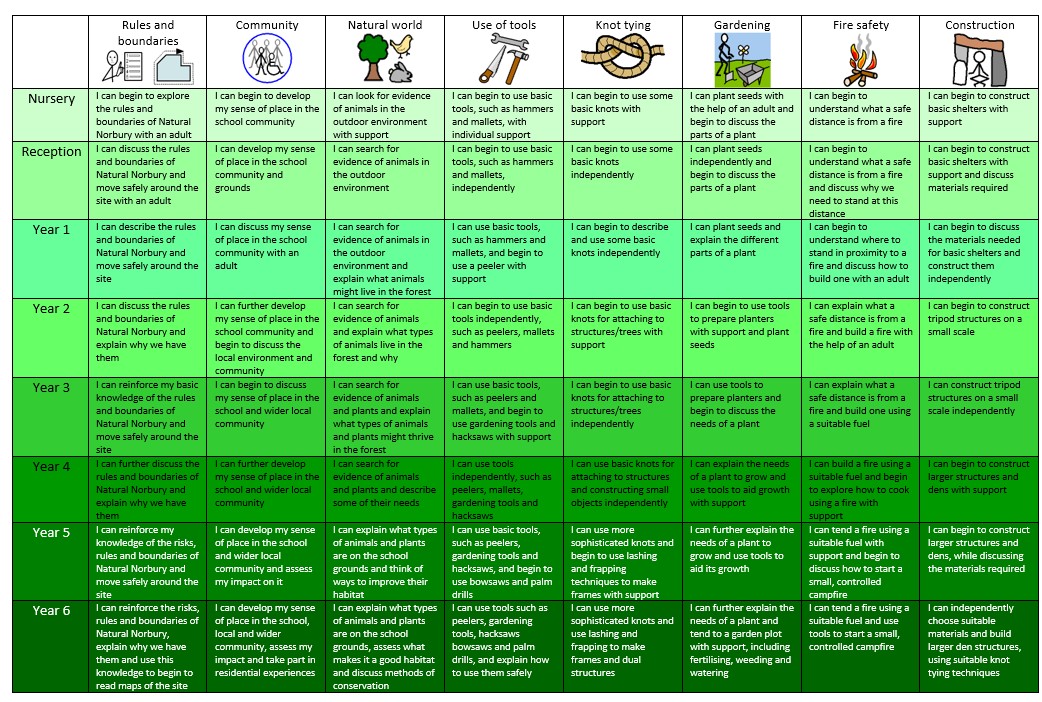Natural Norbury

In line with our school aims and values, we ensure each child regardless of gender, ethnicity, family background, first language and SEN, make good progress across all areas of learning.
Natural Norbury recognises the impact that first hand relevant outdoor learning experiences with our natural environm ent can offer children. Underpinning Natural Norbury, is the understanding that effective learning does not exclusively take place within a classroom , and furtherm ore, that classroom learning can be more effective when children have relevant learning experiences that they can draw upon.Valuing this understanding enables all learners; specifically those who require a greater level of personalisation and choice, open ended challenge and real life learning experiences that can be drawn upon within classrooms. Through engagement with the outdoors and nature, children grow within their capacity as confident individuals and in turn become effective contributors, successful learners and responsible citizens.
Through their experiences of the outdoor Natural Norbury curriculums, children are enabled to accelerate progress within the characteristics of effective learning; playing and exploring (finding out and investigating, having a go,), active learning (sustaining involvem ent, motivation and perseverance) and creating and thinking critically (developing own ideas, making links, choosing ways to do things).How Natural Norbury can increase self esteem
- Natural Norbury ethos is inherently inclusive
- Natural Norbury provides all children with space and freedom within safe boundaries
- All children are nurtured, valued and celebrated by adults who understand the importance of raising children?s self-esteem, confidence, sense of responsibility and independence
- Research substantiates benefits of Forest School for all children e.g. Pavey (2006) and O'Brian and Murray (2006) This research underpins Natural Norbury
Schemas, curriculum, learning styles
Children do not all learn in the same way. As practitioners of young children it is good practice to be aware of the different ways children learn.
During a Natural Norbury session there are numerous opportunities for children to be catered for according to their preferred schema.

Progression of characteristics of effective learning
Children are born ready, able and eager to learn. They actively reach out to interact with other people, and in the world around them. Development Matters in the Early Years foundation stage (EYFS)
All areas of the curriculum are represented at forest school by numerous activities that children can have a go at. The EYFS places big emphasis on effective learning- Playing and exploring and requires that the follow are incorporated in our daily planning.
Finding out and exploring
Children are in constant contact with our natural world, resources, their environment and the seasons
Being willing to have a go
All tasks are achievable and children are encouraged to have a go while being praised for their achievements
Playing with what they know
Children can be taught how to use what?s around us to create something else ,i.e. sticks and leaves
Creating and thinking and having their own ideas
Activities can be adapted depending on the children's dispositions
Making links
while exploring children will make connections between newly acquired knowledge to their previous knowledge
Choosing ways to do things
There are numerous tasks where children are encouraged to give their ideas on how to achieve a task or what is the best way to explore a new activity
Learning styles
Most adults are aware of the learning style that better describes them. Visual, Auditory and Kinaesthetic are learning styles that can be demonstrated by children in our setting and so is very important that all practitioners working with children are aware of all learning styles to better support children learning and development.
By observation during the various activities provided through Natural Norbury practitioners can identify learning styles and then provide opportunities for the different learning style showed by the child. While accommodating a child's own way of learning is important that other ways of learning are promoted too. Children can access all learning possibilities during a forest school session by completing tasks such as:
- Visual- minibeast hunt: children can use pictures on a clipboard to help identify the creatures they find , crowns, bookmarks, etc
- Auditory- end of session talk, use active listening skills such as questioning, follow step to step instruction while playing 123 where are you
- Practical tasks- whittling, sawing, drilling, climbing a tree, den building, etc will suit a kinaesthetic learner
To find out more information, please contact the school office and ask for Mr Smith.